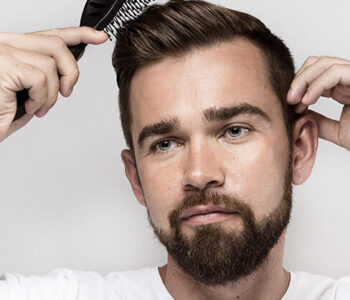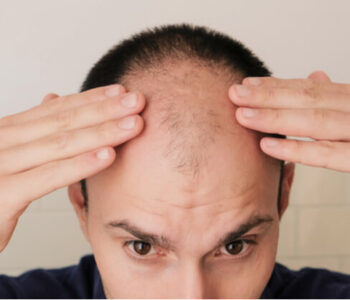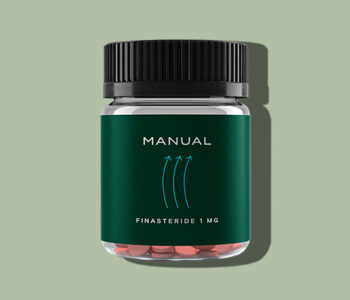In 30 seconds…
What’s the difference between Finasteride and Propecia? It’s really all in the name. Finasteride is the active medical ingredient that works as a treatment for hair loss. Propecia, on the other hand, is the brand name.
Beyond that, Finasteride and Propecia are the same. You will get the same effects and side effects from Finasteride as you would from Propecia. However, as Propecia is better known, you can expect it to cost you more than the unbranded version.
Finasteride works by tackling DHT, a hormone that affects your hair follicles’ ability to produce hair. And as treatments for male pattern baldness go, it’s the best in the business.
Propecia vs Finasteride: Two Treatments for Hair Loss
Male pattern hair loss sucks. A progressive condition that can affect men of any age, male pattern baldness (or MPB) is the common cause of hair loss in men. It is caused in turn by a combination of genetics and hormones – so it may feel like there isn’t much you can do about it.
This, however, would be wrong. MPB is actually reversible. With the right treatment, there is no reason to suffer from the condition. And the best treatment on the market is Finasteride, a drug that gets to the very root of male hair loss. Maybe you’ve heard of Finasteride, or maybe you’ve heard of something called Propecia. There is confusion between them – but when it comes to medicine, we don’t want that.
So, Finasteride vs Propecia: what’s the difference between the two? As you’ll see, they are only two different names for the very same drug. And they are not even the only two. Here, we want to help you cut through the confusion. Let’s take a look.
What is Finasteride?
Finasteride is a drug for the treatment of androgenetic alopecia, the technical name for MPB. It’s the only treatment available that tackles the biological process of hair loss at its root – and, as a result, it is the most effective treatment available.
The drug works by targeting the production of a hormone known as dihydrotestosterone, or DHT. DHT is a problematic little thing. Although crucial for men at an early age, as the hormone accumulates in your body, it can cause problems for hair growth.
That’s because your hair follicles can be sensitive to it. For those men who are genetically susceptible, these follicles can weaken and shrink when exposed to it. After too much exposure, your hair follicles can be permanently damaged and unable to produce any further hair.
Finasteride intervenes in this process to interrupt the production of DHT – and save your hairline. The drug works by inhibiting an enzyme known as 5-alpha reductase. This is responsible for the process in which DHT is created. By stopping this from working to its normal capacity, DHT levels in your scalp are dramatically lowered – by as much as 60%.
How Effective is Finasteride in Combating Hair Loss?
We said above that Finasteride is the most effective treatment for hair loss on the market. We mean it. According to one study that involved 6,000 men, the drug stopped hair loss in 9/10 cases. And for more than three-quarters of these men, their hair grew back too.
One study is never enough to be sure, however. Luckily, another piece of research found that 87% of participants saw their hair coverage increase as a result of the Finasteride treatment.
If you are about to try Finasteride yourself, it is important to know that effects aren’t seen immediately. In most cases, you will need to continue treatment for 3-6 months to experience much difference. Best results are seen between 6 and 12 months of continued use.
What is Propecia?
So, that’s Finasteride. But what is Propecia? There is no medical difference between Propecia and Finasteride. What distinguishes them is only a matter of name. Finasteride is the active ingredient in Propecia.
Back in the 1980s, a pharmaceutical company called Merck and Co. were investigating treatments for benign prostatic hyperplasia (BPH) or an enlarged prostate. When they trialled Finasteride, they found that it was hugely effective in encouraging hair growth.
As a result, the company applied for a licence to sell Finasteride as a treatment for male balding – and they chose the name Propecia. However, as happens with medicines, the licence to manufacture the drug expired in 2014, enabling it to be produced by other manufacturers. That means that you can take the generic version of the drug, without paying for the brand name.
That’s the only difference. So, you can trust that Propecia works as well as generic Finasteride. The thing is you’ll be also paying for the name.
Propecia vs Finasteride – vs Proscar?
You may have heard that Finasteride goes by another name still. That’s Proscar. While this is the same active drug, Proscar is not intended as a hair loss treatment. Rather, due to its higher dose, it is actually aimed at the treatment of BPH.
Rather than the Finasteride 1mg dose, Proscar comes in 5mg doses. However, this does not mean that it is five times more powerful – nor that it will increase the effects of Finasteride. If anything, it will increase the chances of side effects, which aren’t exactly what you want.
The Side Effects: Are these the Same Too?
It is worth being as clear as possible about the potential side effects of Propecia and Finasteride. Being the same drug, they share the same risk of side effects. However, this risk is incredibly low.
You may have heard some horror stories about the possible side effects of Finasteride. These have been said to include a number of sexual side effects, including sexual dysfunctions such as erectile dysfunction, problems with ejaculation, and decreased libido. However, despite much publicity, these are not nearly as common as you have been led to believe.
The US Food and Drugs Authority (FDA) received 421 reports of sexual dysfunction over 13 years. In 86% of these cases, the side effects stopped when treatment was discontinued. While Finasteride and Propecia both have the same risk of side effects – as they are indeed the same drug – this risk is low. In fact, 98.6% of men don’t feel any side effects whatsoever.

Works for 9/10 Men
The most effective oral treatment for receding hairlines and balding crowns. Just one pill a day.
Key Takeaways: Propecia vs Finasteride
Propecia vs Finasteride – is there a difference between the two? No, there is not. Propecia is the brand name for the active ingredient known as Finasteride. As such, they are the same drugs and cause the same effects. The only difference is one of price – as, with Propecia, you’ll be paying for the brand. Both are effective ways to tackle male pattern hair loss. They can encourage hair regrowth in 9/10 cases.









